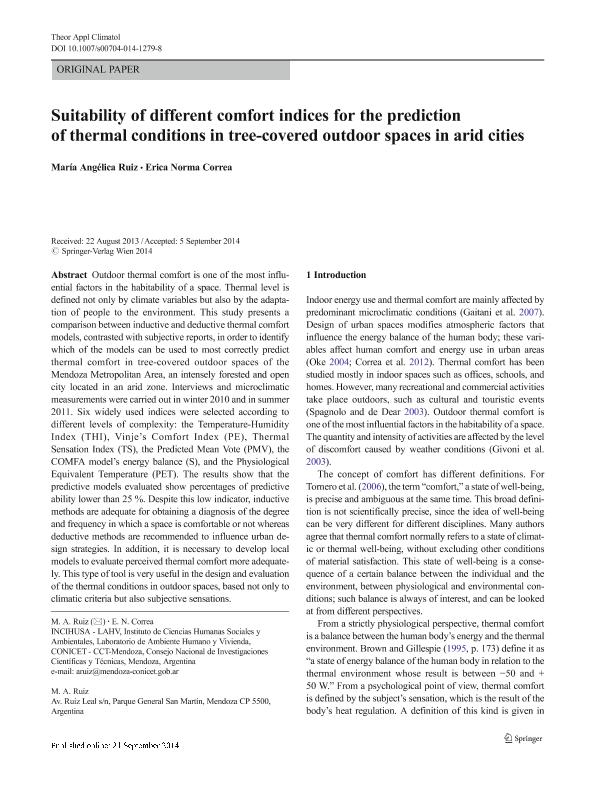Mostrar el registro sencillo del ítem
dc.contributor.author
Ruiz, María Angélica

dc.contributor.author
Correa Cantaloube, Erica Norma

dc.date.available
2017-08-28T18:01:51Z
dc.date.issued
2014-09-21
dc.identifier.citation
Ruiz, María Angélica; Correa Cantaloube, Erica Norma; Suitability of different comfort indices for the prediction of thermal conditions in tree-covered outdoor spaces in arid citie; Springer Wien; Theory & Application Climatology; 122; 1-2; 21-9-2014; 69–83
dc.identifier.issn
0177-798X
dc.identifier.uri
http://hdl.handle.net/11336/23119
dc.description.abstract
Thermal comfort of people in outdoor environments is one of the most influential factors in the habitability of spaces. The comfort level is determined not only by climate variables but also by the adaptation of people to the environment. This work presents a comparative study among five thermal comfort indices and its contrast with subjective answers in order to identify which of them can be better used to predict thermal comfort in forested outdoor spaces of the Mendoza Metropolitan Area, a city located in an arid zone whose configuration corresponds with the "oasis city" type. The microclimatic measurements and the subjective surveys were carried out during winter of 2010 and summer of 2011. Five indices used internationally were selected: the Temperature-Humidity Index (THI), the Vinje Index (PE), the thermal sensation index (TS), the Predicted Mean Values (PMV), and the COMFA model. The results show that all the mathematical models evaluated present percentages of predictive correctness lower than 25%. Despite this low indicator, the use of inductive methods is recommended to know if a certain space is under comfort or discomfort conditions, whereas deductive methods should be used to intervene on urban design strategies. In addition, it is necessary to develop local models to evaluate the thermal comfort perceived by the inhabitants of the studied city more adequately. These tools are very useful in the design and evaluation of the thermal behaviour of open spaces according not only to climate criteria but also to the subjective characteristics of users.
dc.format
application/pdf
dc.language.iso
eng
dc.publisher
Springer Wien

dc.rights
info:eu-repo/semantics/openAccess
dc.rights.uri
https://creativecommons.org/licenses/by-nc-sa/2.5/ar/
dc.subject
Thermal Comfort Indices
dc.subject
Oasis City
dc.subject
Open Spaces
dc.subject
Predictive Correctness
dc.subject.classification
Ingeniería Oceanográfica

dc.subject.classification
Ingeniería del Medio Ambiente

dc.subject.classification
INGENIERÍAS Y TECNOLOGÍAS

dc.title
Suitability of different comfort indices for the prediction of thermal conditions in tree-covered outdoor spaces in arid citie
dc.type
info:eu-repo/semantics/article
dc.type
info:ar-repo/semantics/artículo
dc.type
info:eu-repo/semantics/publishedVersion
dc.date.updated
2017-08-11T15:09:25Z
dc.identifier.eissn
1434-4483
dc.journal.volume
122
dc.journal.number
1-2
dc.journal.pagination
69–83
dc.journal.pais
Austria

dc.journal.ciudad
Viena
dc.description.fil
Fil: Ruiz, María Angélica. Consejo Nacional de Investigaciones Científicas y Técnicas. Centro Científico Tecnológico Conicet - Mendoza. Instituto de Ciencias Humanas, Sociales y Ambientales; Argentina
dc.description.fil
Fil: Correa Cantaloube, Erica Norma. Consejo Nacional de Investigaciones Científicas y Técnicas. Centro Científico Tecnológico Conicet - Mendoza. Instituto de Ciencias Humanas, Sociales y Ambientales; Argentina
dc.journal.title
Theory & Application Climatology

dc.relation.alternativeid
info:eu-repo/semantics/altIdentifier/doi/http://dx.doi.org/10.1007/s00704-014-1279-8
dc.relation.alternativeid
info:eu-repo/semantics/altIdentifier/url/https://link.springer.com/article/10.1007%2Fs00704-014-1279-8
Archivos asociados
